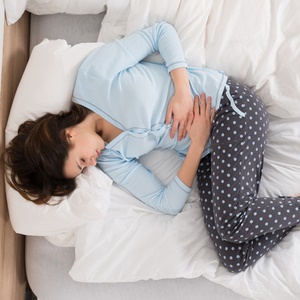
Tanya* has been experiencing severe mood swings and erratic emotions since her period started at the age of 15, but has always dismissed it as "normal" PMS.
Although a doctor put her on oral contraception that eased physical symptoms like bad cramps, her mood preceding her period would be filled with despair and suicidal thoughts – clearing up the moment her period started.
The week before each period would always be a nightmare. Seemingly minor problems at work would drive her to tears, she would struggle to complete a task at hand, have problems sleeping and would pick fights with her spouse and anyone else in her immediate vicinity.
It wasn’t until she was called in by her boss for some glaring errors in a very important presentation that she realised how much her symptoms affected her daily life.
Something so severe had to have a name, right?
When is it not PMS?
PMDD (premenstrual dysphoric disorder) affects between 2 and 5% of women. Women experience extreme mood swings and depression at the time right before their menstrual cycle, which then clears up as soon as bleeding starts.
These symptoms can have an extreme impact on a person's daily life or activities, and can easily be dismissed as PMS (premenstrual syndrome). The statistics for PMDD are therefore much lower, as diagnosis is harder.
Diagnosing PMDD
Just like PMS, PMDD starts around ten to seven days before the menstrual cycle and clears up as soon as bleeding starts, although it can last longer in some cases.
Both PMS and PMDD can cause bloating, breast tenderness and food cravings, but according to the American Family Physician, at least five of these eleven symptoms must be present before PMDD is diagnosed:
- Persistent and severe anger or irritability
- A noticeable lack of interest in usual interests or activities
- An extreme lack of concentration and difficulty with completing tasks
- Lethargy or fatigue not caused by any other pre-existing condition
- A change in appetite, marked by over- or undereating, or very specific food cravings
- A lack of sleep, or too much sleep
- Feeling overwhelmed by daily activities, or feeling out of control
- Physical symptoms similar to PMS such as bloating, a sensation of weight gain, headaches and breast tenderness
If severe depression is experienced, it is important to rule out other mental conditions before attributing the symptoms to PMDD. When mental conditions are ruled out, a physical and pelvic exam can be done by a doctor or gynaecologist. In order for a diagnosis, the above symptoms should cause a severe interruption of daily life.
New research could explain why women get PMDD
The exact cause of PMDD has never been clear in the past, but researchers are getting closer to finding an answer.
A recent study published in Molecular Psychiatry has shown that when oestrogen and progesterone were repressed with drugs in women with PMDD, their symptoms dissipated, but would flare up as soon as the hormones were released again.
The study showed that women who suffer from PMDD are more sensitive to hormones. The study also found that the specific gene network in women with PMDD causes cells to react differently to hormones, explaining their sensitivity.
Other factors such as alcohol and substance abuse, or thyroid conditions can trigger symptoms of PMDD.
Banish the blues and bloating
The following methods have been suggested by Harvard Medical School to help relieve the symptoms of PMDD and PMS:
- Antidepressants that slow the reuptake of serotonin have been proven to alleviate the symptoms of PMDD. Consult your doctor about a prescription if you experience extreme mood swings or lows, and depression or other mental conditions have been ruled out.
- Stick to healthy eating habits and mild exercise to relieve symptoms. Decreasing caffeine, alcohol or sugar intake and quitting smoking may relieve the symptoms. Mild exercise can also elevate one's mood.
- Hormone therapy such as oral contraceptives may offer a form of relief.
* Name has been changed.
Read more:




 Publications
Publications
 Partners
Partners















